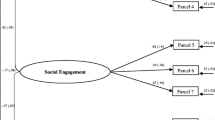Abstract
In view of the current interest in children's peer relationships and social skills, and the need for valid assessment procedures for children's peer problems, the intent of the present study was to examine the correspondence between peer ratings of acceptance and teacher ratings of a child's social behavior and likability. The 92 children were males and females from the third, fourth, and fifth grades. Classroom teachers rated each of the children on withdrawn, aggressive, and likable behavior using the Pupil Evaluation Inventory. Peer ratings of the child's acceptance in play and work situations were obtained from same-sex classmates. The teacher rating of likability was the best predictor of peer acceptance scores for males; withdrawn behavior was the best predictor of peer acceptance scores for females. Ratings of withdrawn and aggressive behavior contributed to the prediction of peer acceptance scores for males; for females, only withdrawn behavior contributed to the prediction of peer acceptance. In terms of the clinical utility of teacher ratings for assessing children with peer problems, the use of the withdrawn and/or aggressive ratings scales appeared to offer promise as a means of identifying such children. Implications for the area of children's social skills and directions for future research were discussed.
Similar content being viewed by others
References
Asher, S. R., Singleton, L. C., Tinsley, B. R., & Hymel, S. A reliable sociometric measure for preschool children.Developmental Psychology, 1979,15, 443–444.
Cowen, E. L., Pederson, A., Babjian, H., Izzo, L. D., & Trost, M. A. Long term follow up of early detected vulnerable children.Journal of Consulting and Clinical Psychology, 1973,43, 438–446.
Evers, W. L., & Schwarz, J. C. Modifying social withdrawal in preschoolers: The effects of filmed modeling and teacher praise.Journal of Abnormal Child Psychology, 1973,1, 248–256.
Gottman, J., Gonso, J., & Rasmussen, B. Friendships in children.Child Development, 1975,46, 709–718.
Gottman, J., Gonso, J., & Schuler, P. Teaching social skills to isolated children.Journal of Abnormal Child Psychology, 1976,4, 179–198.
Keller, M. F., & Carlson, P. M. The use of symbolic modeling to promote social skills in preschool children with low levels of social responsiveness.Child Development, 1974,45, 912–919.
La Greca, A. M., & Mesibov, G. B. Social skills intervention with learning disabled children: Selecting skills and implementing training.Journal of Clinical Child Psychology, 1979,8, 234–241.
La Greca, A. M., & Santogrossi, D. A. Social skills training with elementary school students: A behavioral group approach.Journal of Consulting and Clinical Psychology, 1980,48, 220–228.
Miller, N., & Maruyama, G. Ordinal position and peer popularity.Journal of Personality and Social Psychology, 1976,33(2), 123–131.
O'Connor, R. D. The relative efficacy of modeling, shaping, and the combined procedure for the modification of social withdrawal.Journal of Abnormal Psychology, 1972,79, 327–334.
Oden, S. L., & Asher, S. R. Coaching low-accepted children in social skills: A follow-up sociometric assessment.Child Development, 1977,48, 496–506.
Pekarik, E. G., Prinz, R. J., Liebert, D. E., Weintraub, S., & Neale, J. M. The pupil evaluation inventory: A sociometric technique for assessing children's social behavior.Journal of Abnormal Child Psychology, 1976,4, 83–97.
Reardon, R. C., Hersen, M., Bellack, A. S., & Foley, J. M. Measuring social skills in grade school boys.Journal of Behavioral Assessment, 1979,1, 87–105.
Roff, M., & Sells, B. B. Juvenile delinquency in relation to peer acceptance-rejection and socioeconomic status.Psychology in the Schools, 1968,5, 3–18.
Singleton, L. C., & Asher, S. R. Peer preferences and social interaction among third-grade children in an integrated school district.Journal of Educational Psychology, 1977,69, 330–336.
Van Hasselt, V. B., Hersen, M., Whitehill, M. B., & Bellack, A. S. Social skill assessment and training for children: An evaluative review.Behaviour Research and Therapy, 1979,17, 413–437.
Weinrott, M. R., Corson, J. A., & Wilchesky, M. Teacher-mediated treatment of social withdrawal.Behavior Therapy, 1979,10, 281–294.
Author information
Authors and Affiliations
Rights and permissions
About this article
Cite this article
La Greca, A.M. Peer acceptance: The correspondence between children's sociometric scores and teachers' ratings of peer interactions. J Abnorm Child Psychol 9, 167–178 (1981). https://doi.org/10.1007/BF00919112
Revised:
Issue Date:
DOI: https://doi.org/10.1007/BF00919112



